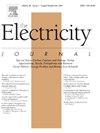基于nexus的电力部门快速转型影响评估:以希腊为例
IF 2.2
Q1 Social Sciences
引用次数: 0
摘要
电力系统转型可以在环境、经济、资源系统和生物多样性等多个经常相互关联的方面产生广泛的影响。因此,评估电力系统转型的多维影响,特别是在快速转型的情况下,变得越来越重要。然而,当涉及到将这种分析应用于面临结构性社会经济挑战的地中海国家时,文献中存在空白。本文探讨了到2035年希腊电力部门快速脱碳的潜在多方面影响,重点关注地方层面的后果。评估标准包括成本最优电力组合、电力成本、土地利用、生物质利用、国内生产总值和就业。在这项工作中,代表希腊电力部门的技术丰富的成本优化模型与关注希腊经济的全球可计算一般均衡(CGE)宏观经济模型相关联。结果表明,希腊电力部门的快速脱碳可能会在短期和中期引发积极的社会经济后果(到2030年,GDP: +1.70,员工:+59,000),尽管由于资本投资需求的增加,它可能会导致负面的长期社会经济影响。此外,对土地使用的影响可能微不足道,随着时间的推移,由于生物质能发电的减少,可能会减少,从而减少损害生物多样性的风险。本文章由计算机程序翻译,如有差异,请以英文原文为准。
A Nexus-Based Impact Assessment of Rapid Transitions of the Power Sector: The Case of Greece
Power system transformation can unleash wide-ranging effects across multiple, frequently interlinked dimensions such as the environment, economy, resource systems, and biodiversity. Consequently, assessing the multidimensional impacts of power system transformation, especially under rapid transitions, has become increasingly important. Nonetheless, there is a gap in the literature when it comes to applying such an analysis to a Mediterranean country facing structural socioeconomic challenges. This paper explores the potential multifaceted implications of rapidly decarbonizing the Greek power sector by 2035, focusing on the local-level consequences. The evaluation criteria encompass the cost-optimal power mix, power costs, land use, biomass utilization, GDP, and employment. In this effort, a technology-rich cost optimization model representing Greece’s power sector is linked to a global Computable General Equilibrium (CGE) macroeconomic model focusing on the Greek economy. The results indicate that a fast decarbonization of the Greek power sector could trigger positive socioeconomic consequences in the short- and medium-term (GDP: +1.70, employees: +59,000 in 2030), although it may induce negative long-term socioeconomic effects due to increased capital investment requirements. Additionally, the impact on land use may only be trivial, with the potential to decrease over time due to the de-escalation of biomass power generation, thereby reducing the risk of harming biodiversity.
求助全文
通过发布文献求助,成功后即可免费获取论文全文。
去求助
来源期刊

Electricity Journal
Business, Management and Accounting-Business and International Management
CiteScore
5.80
自引率
0.00%
发文量
95
审稿时长
31 days
期刊介绍:
The Electricity Journal is the leading journal in electric power policy. The journal deals primarily with fuel diversity and the energy mix needed for optimal energy market performance, and therefore covers the full spectrum of energy, from coal, nuclear, natural gas and oil, to renewable energy sources including hydro, solar, geothermal and wind power. Recently, the journal has been publishing in emerging areas including energy storage, microgrid strategies, dynamic pricing, cyber security, climate change, cap and trade, distributed generation, net metering, transmission and generation market dynamics. The Electricity Journal aims to bring together the most thoughtful and influential thinkers globally from across industry, practitioners, government, policymakers and academia. The Editorial Advisory Board is comprised of electric industry thought leaders who have served as regulators, consultants, litigators, and market advocates. Their collective experience helps ensure that the most relevant and thought-provoking issues are presented to our readers, and helps navigate the emerging shape and design of the electricity/energy industry.
 求助内容:
求助内容: 应助结果提醒方式:
应助结果提醒方式:


